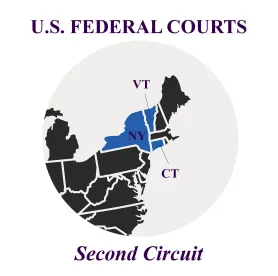In July 2020, in In re Guo,1 the U.S. Court of Appeals for the Second Circuit reaffirmed that in the Second Circuit, a party may not use 28 U.S.C. § 1782 (Section 1782) to obtain documents or other discovery for use in a foreign private international commercial arbitration. This decision further deepens a circuit split on this issue and increases the likelihood that the U.S. Supreme Court will ultimately weigh in on the scope of Section 1782 in the future.
Section 1782 authorizes federal district courts to compel the production of materials “for use in a proceeding in a foreign or international tribunal” upon “the application of any interested person.” Petitioner Guo initiated his Section 1782 application in the Southern District of New York (the District Court) seeking discovery of documents from underwriters in New York for use in an arbitration he had initiated before the China International Economic and Trade Arbitration Commission (CIETAC), one of the leading international arbitration institutions in China. The District Court denied Guo’s application on the grounds that the CIETAC was not a “foreign tribunal” within the meaning of Section 1782, relying on Nat’l Broad. Co., Inc. v. Bear Stearns & Co., which found that the drafters of Section 1782 had intended for the statute to apply only to governmental entities.2
The District Court and the Second Circuit both analyzed various factors in order to determine whether the CIETAC was a “foreign tribunal.” As described by the Second Circuit, CIETAC was established by the People’s Republic of China in 1954 as part of the China Council for the Promotion of International Trade (CCPIT). CIETAC’s administrative leadership is appointed by the CCPIT, although the arbitrators who preside over any given case are selected by the parties from a list that is compiled by CIETAC without the involvement of the CCPIT. Potential arbitrators are not required to have any positions within the Chinese government, and both CIETAC and CCPIT receive limited funding from the Chinese government.
CIETAC’s jurisdiction is restricted to disputes between private parties who have elected CIETAC arbitration through contractual agreement, as well as certain contractual disputes arising between investors and Chinese governmental entities. While Chinese law has limited circumstances where an award may be set aside, the arbitrators work independently of the Chinese government. In Guo’s case, the arbitration was initiated pursuant to contractual agreement.3
The Second Circuit affirmed the District Court’s decision finding that the CIETAC was not a “foreign tribunal” within the meaning of Section 1782 and affirmed that its 1999 decision in Nat’l Broad. Co., Inc. v. Bear Stearns & Co.4 remains good law. The Second Circuit reiterated that Section 1782 relief is not available in a private commercial arbitration and found that, on review of the facts above, CIETAC was more akin to a private commercial arbitral tribunal. The Second Circuit relied on the legislative history of 28 U.S.C. § 1782, finding that although “foreign tribunal” is ambiguous in the statute itself, the legislative reports mention “quasi-judicial agencies” but do not reference private arbitration. Academic treatises relied on by Congress in contemplating the legislation referred to “intergovernmental arbitration and other state-sponsored dispute resolution mechanisms,” but do not mention private arbitration. Under Nat’l Broad Co., Inc. v. Bear Stears & Co., “international arbitral panels created exclusively by private parties are not foreign or international tribunals within the meaning of § 1782.”5
The Second Circuit’s decision is just part of a growing circuit split across jurisdictions. The Second Circuit is prominently joined by the Fifth Circuit, which has agreed with the reasoning of In re Guo in its own cases. One Fifth Circuit case backing the narrow interpretation of Section 1782 added that “empowering parties in international arbitrations to seek ancillary discovery through federal courts could destroy arbitration's principal advantage as a speedy, economical, and effective means of dispute resolution if the parties succumb to fighting over burdensome discovery requests far from the place of arbitration.”6
In September 2020, the Seventh Circuit also joined the Second and Fifth Circuits, and in Servotronics, Inc. v. Rolls-Royce PLC7 similarly found that Section 1782 does not authorize a district court to compel discovery for use in private foreign arbitration.
That being said, not every jurisdiction has adopted the Second Circuit’s narrow definition of a “foreign tribunal” under Section 1782. The Fourth Circuit8 and Sixth Circuit9 have notably reached the opposite opinion on this issue. Those Circuits have interpreted the U.S. Supreme Court’s decision in Intel Corp. v. Advanced Micro Devices, Inc.10 to hold that a Section 1782 application may be used in order to obtain documents in aid of a foreign, private arbitration. The Fourth Circuit’s decision in Servotronics, Inc. v. Boeing Co. is completely irreconcilable with the Seventh Circuit’s decision in Servotronics, Inc. v. Rolls-Royce PLC because the Petitioner in both Section 1782 Applications was the same, and the discovery sought was in aid of the same private foreign arbitral proceeding.
Hans Smit, one of the drafters of Section 1782, has embraced the more expansive definition of a “foreign tribunal” and calls the narrow approaches of the Second, Fifth, and Seventh Circuits “regrettable.”11 According to Smit, the drafters of the provision replaced “court” with “foreign tribunal” when 28 U.S.C. § 1782 was last amended, making clear their preference that it should expand to cover both public courts and private arbitration. Given that the Supreme Court has announced in several decisions that it favors international arbitration, Smit is troubled that some circuit courts continue to undermine this policy by weakening Section 1782.
Because a Section 1782 application must be brought in a court having personal jurisdiction over the entity from which information is sought, there is often little flexibility in choosing a forum for such an application. That being said, where the target entity may be subjected to jurisdiction in the Fourth or Sixth Circuit, the Section 1782 discovery may be granted for use even if requested for use in a foreign private arbitration. The result on this issue in the Third Circuit is still somewhat uncertain, although earlier this year a district court in Delaware found that a private arbitral tribunal in Germany was not a “foreign tribunal” under Section 1782, citing case law on both sides of the circuit split discussed above.12 That decision has been appealed to the Third Circuit, which is likely to rule in early 2021.13
CONCLUSION
The Second Circuit’s In re Guo decision highlights the uncertainty of Section 1782 relief for parties in foreign private arbitration. Applicants in the Second Circuit can expect that courts will continue to deny Section 1782 applications where documents are sought in aid of a foreign private arbitration, but applicants in the Fourth and Sixth Circuits will likely be able to obtain such discovery.
In any event, given the deepening circuit split interpreting the term “foreign tribunal” differently across the country, there is a growing likelihood that the U.S. Supreme Court will address the conflicting interpretations in an upcoming term.
Footnotes
1 965 F.3d 96 (2d Cir. July 8, 2020), as amended (July 9, 2020).
2 In re Application of Hanwei Guo for an Order to Take Discovery for Use in a Foreign Proceeding Pursuant to 28 U.S.C. § 1782, No. 18-MC-561 (JMF), 2019 WL 917076 (S.D.N.Y. Feb. 25, 2019).
3 In Re Guo, 965 F.3d at 100-01, 108.
4 165 F.3d 184 (2d Cir. 1999).
5 In Re Guo, 965 F.3d at 103.
6 El Paso Corp. v. La Comision Ejecutiva Hidroelectrica Del Rio Lempa, 341 F. App'x 31, 33–34 (5th Cir. 2009) (quotations omitted).
7 No. 19-1847, 2020 WL 5640466 (7th Cir. Sept. 22, 2020).
8 Servotronics, Inc. v. Boeing Co., 954 F.3d 209 (4th Cir. 2020).
9 In re Application to Obtain Discovery for Use in Foreign Proceedings, Abdul Latif Jameel Transportation, Ltd. v. FedEx Corporation, 939 F.3d 710 (6th Cir. 2019).
10 542 U.S. 241 (2004)
11 See, e.g., Hans Smit, American Assistance to Litigation in Foreign and International Tribunals: Section 1782 of Title 28 of the U.S.C. Revisited, 25 Syracuse J. Int'I L. & Com 1 (1998), available here.
12 In re EWE Gasspeicher GmbH, No. CV 19-MC-109-RGA, 2020 WL 1272612 (D. Del. Mar. 17, 2020).
13 As of the date of publication, the First, Eighth, Ninth, Tenth, and Eleventh Circuits do not appear to have directly addressed the question of whether a foreign private arbitration constitutes a “foreign tribunal” under Section 1782.





 />i
/>i
